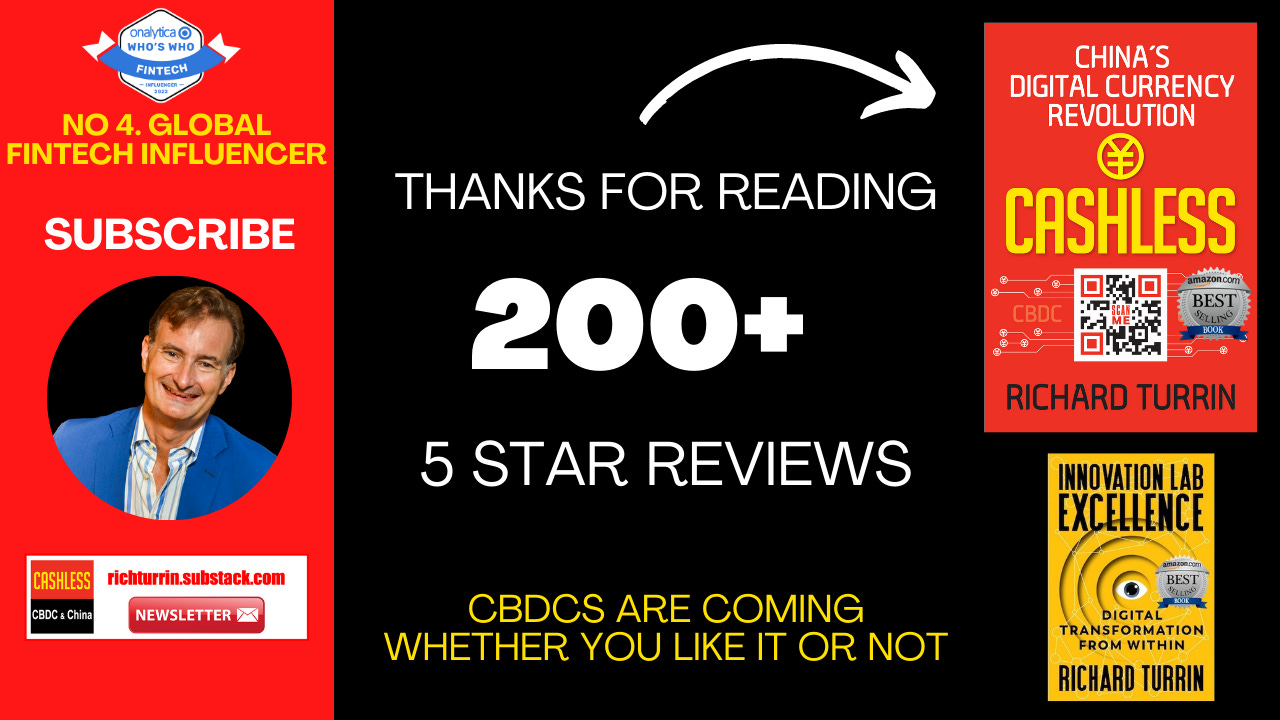Focus Africa and Asia! Africa: FinTech Momentum Grows as the UNDP Lays Down the Law for Crypto Use, Asia: an Innovation Powerhouse, Banks Top 10 Trends for 2023
CBDC Privacy: One Size Doesn't Fit All
1. Africa: FinTech Momentum
2. Africa: UNDP Lays Down the Law for Crypto
3. Asia: An Innovation Powerhouse
4. Banks Top 10 Trends for 2023
5. CBDC Privacy: One Size Doesn’t Fit All
Dall-e’s view of Africa and Asia which fits today’s focus
1. Africa: FinTech Momentum
Africa’s FinTech, the world is taking notice!
A great in-depth report by Financial Technology Partners / FT Partners beautifully captures the fintech changes hitting Africa. This report covers it all!
This 200 page report has something for everyone! Download: here
As much as I love this report, I ask that all objective readers ask one fundamental question: Are unicorns whose revenue is based on profits from the poor the only way forward? I don’t think so, and this is why government-sponsored CBDCs as a “public good” are being actively pursued throughout the continent. My belief is that they are a critical component of inclusion in Africa! Before you call me a “dreamer,” look at India, where the wildly successful UPI system and now CBDC were both developed by the Reserve Bank to make payments a “public good” and have fostered tremendous fintech innovation.
Let’s look at the good and the bad of Africa:
🔴 The Bad:
1️⃣ The root cause for Africa’s 65% un/underbanked population is a large rural population and relatively poor transportation infrastructure that reduces access to banking services.
2️⃣ A negative spiral effect is triggered where low-income levels and relatively unattractive unit economics for banks serving these low-income customers further slow down the buildup of banking infrastructure.
3️⃣ Most African consumers and SMEs continue to be excluded from access to credit due to lack of credit bureau coverage, creating an opportunity for alternative data based underwriting pioneered by Alipay.
🟢 The Good:
4️⃣ Africa has the world’s fastest-growing population at a rate of 2.7%, combined with the continent’s median age of just 20 years old (compared to India’s 28, China’s 38, and Western Europe’s 44) and unparalleled urban growth.
5️⃣ The increase in mobile devices and underdeveloped financial infrastructure has greatly propelled the mobile money space in the region. Mobile carriers are at the forefront of mobile money growth.
6️⃣ Mobile penetration is now nearing 80%, and broadband internet penetration is rising. Thank Huawei with 70% of 4G networks!
7️⃣ The African Continental Free Trade Area (AfCFTA) comprises 54 countries, a population of 1.3 billion, and a 2022 GDP of nearly $3.0 trillion.
8️⃣ The six key markets with high GDP growth and young populations are: South Africa, Egypt, Ghana, Nigeria, Kenya, and Senegal.
9️⃣ Cryptocurrencies, CBDCs, and stablecoins will contribute to the e-payments ecosystem in Africa and may allow the continent to leapfrog into the future.
🔟 Eighteen CBDC projects are underway on the continent, with Nigeria’s eNaira the first. The impact of these CBDCs on payments, remittances, and the AfCFTA will be significant. Will they disrupt payment fintechs?
Takeaways:
Africa is ripe for fintech development to fill long pent-up demand.
This won’t happen overnight, and investors must be prepared for surprises.
Is there “A Genuine Need for Crypto?” The UNDP disagrees and sees a significant risk.
CBDCs as a “public good” will be transformational.
2. Africa: UNDP Lays Down the Law for Crypto
UNDP lays down the LAW for CRYPTOCURRENCY in Africa.
The UNDP takes a cautious view of Crypto, not tossing it out but laying down strict control for crypto if it is to operate in Sub-Saharan Africa (SSA).
Download: here
This policy mirrors prior reports by the UNCTAD (behind the UNDP report) that are fiercely critical of "crypto bros" claims that it is a panacea to inclusion.
See my article
“The UN says “no” to crypto in developing nations”
based on the UNCTAD report:
Meanwhile, SSA gov’ts seem split on crypto, with a full 30% imposing bans and 70% taking a neutral or uncertain policy approach.
The UNDP’s suggested policies are “hard-core:”
1️⃣ Countries should improve investment in digital infrastructure, modernize payment systems, and enhance digital and financial literacy and risk education for citizens...regardless of policy stances towards crypto.
-BEFORE moving to crypto, provide digital access to all!
2️⃣ National authorities need to consider prioritizing targeted implementation of existing global regulatory standards...on cryptocurrency…. that allows for rapid review ...of their risks.
-KYC, AML, FATF and strict risk control.
3️⃣ Further testing of the potential merits of cryptocurrencies, such as financial inclusion for different geographic, income and gender groups, .... in fintech-related regulatory sandboxes.
-TEST crypto in controlled sandboxes, not in the free-for-all we have now. Does it work for all?
4️⃣ 🔥Countries that need enhanced monetary policy control may assess and consider the issuance feasibility of CBDC with good payment systems to counter dollarization risks facilitated by increasing adoption of cryptocurrencies. 🔥
-LOOK TO CBDCs! Crypto dollarization “undermines the countries’ effective control over monetary policy, financial stability, and economic growth.” It also increases USD-based food insecurity.
5️⃣ Establishing guidance and/or a legislative framework for taxation of cryptocurrencies...in countries with rapid and wide cryptocurrency adoption.
-Tax collection, not "wild west."
6️⃣ Appropriate policy frameworks can be considered regarding energy and carbon aspects of cryptocurrency mining...
-No free pass for environmental issues!
Takeaways:
The UNDP is clear that crypto needs control if it is to play a role in SSA's financial future.
As detailed in all UN papers, dollarization through crypto and currency destabilization are big problems!
CBDCs use native currency trade and avoid crippling dollarization.
I’m skeptical crypto is a panacea for inclusion in SSA, but if it can be regulated and fill a gap, why not?
Why am I skeptical? Read this article from Brookings: “Debunking the narratives about cryptocurrency and financial inclusion.” This is a scathing account of why crypto fails to bring financial inclusion: Here
3. Asia: An Innovation Powerhouse
Asia rising as innovation and digitalization lay the foundation for the Asian century.
The IMF looks at Asia and sees that both innovation and digitalization are key to reversing the productivity losses brought by COVID to build what I see as the coming Asian Century.
Download: Here
Asia’s accomplishments are astounding, but few seem to pay attention!
Asia is an innovation Powerhouse:
🔹 As the world’s “manufacturing powerhouse” about 2/3 of all of the world’s industrial robots are in Asia.
China is the world leader, with an astounding 30% of the global total. What better way for China to hedge against its demographic shift?
In pre-pandemic statistics, China, Korea, and Japan each employed more robots than the US.
🔹 Pre-pandemic, the region contributed to more than half of the world’s patents, including 60% of patents in digital and computer technologies.
Asia’s emergence as an innovation hub was driven by a few “frontier countries,” China, Japan, and Korea, that spend nearly as much as most innovative economies worldwide in R&D.
Asia is ahead of Europe and the Americas in terms of patent outputs, although in per capita terms, it still trails Europe.
🔹 Then there are homegrown Asian tech giants, which account for 60% of the world’s online retail sales.
China’s Alibaba and JD.com have nearly 40% of the global e-commerce market share by merchandise volume. Meanwhile, Japan’s Rakuten, Singapore’s Sea Group, Korea’s Coupang, and Indonesia’s Go-Jek generate revenue in Asia similar to large firms in the US, including Amazon, Walmart, and their local subsidiaries!
Asia is two different worlds with “frontier” countries on the cutting edge and developing nations dependent on “tech dispersion” from frontier countries and hamstrung with large digital divides and bottlenecks.
Asia needs to own this disparity and close this gap. This is why the IMF suggests Asia’s reform priorities include:
• Enhancing countries’ digital infrastructure to improve access to information and technology.
• Upgrading digital literacy and upskilling the young workforce in many countries to meet employers’ demands.
• Alleviating financing constraints faced by SMEs to help them adopt new technologies.
• Facilitating adoption of new technologies by streamlining regulations in line with the evolving digital industry.
Takeaways:
Watch as innovation and digitization permeate Asia, allowing them to pull away in the tech race.
Best case: this will be the Asian century.
Worst case: Asia can’t close its gap between high and low-tech nations, doesn’t reach full potential but is still huge.
I wouldn't bet on the worst case!
4. Banks Top 10 Trends for 2023….Reordered!
Accenture’s Top 10 Banking Trends for 2023 is a great read -IF- you reprioritize them!
Accenture did a great job on this report, but their top 10 order needs a bit of reordering to get it right!
Author’s note: Michael Abbott, the report’s author, graciously reached out to me on LinkedIn to thank me for sharing the report. He commented that it was not his intent to list the “Top 10” by order of importance but he would do so next year! So to be fair this is my ordering not a “re-order” of Accenture’s! Download: here
Here's how I reprioritize Accenture's Top 10 with short explanations as to why I think they got the right trends but in the wrong order: (my comments in italics)
1️⃣ Right culture, right talent (Accenture No. 4)
Talent will make ever-increasing demands on banks’ leadership.
If you get this wrong, nothing else on this list matters. No 1, not 4!
2️⃣ Core modernization: a change of heart (Accenture No. 10)
Tech modernization is a “forever” process. ...2023 the watershed for the start of core modernization.
Why is this dead last at No 10? What at are banks waiting for? Modernize the core so that No 3 and 4 below can become real!
3️⃣ Data becomes a product (Accenture No. 6)
Treating data as a product is a shift in mindset that has the potential to transform the foundations of banking.
This is huge! Accenture says to go on the metaverse before figuring out data. Puts the cart in front of the horse!
4️⃣ Life centricity: from journeys to intent (Accenture No. 9)
As bigtechs and super-apps continue to grow, banks will look beyond customer journeys to address customers’ holistic well-being.
So PayPal, Apple, and Amazon are gunning for your bank and this is No 9?
5️⃣ Fintechs: from disruptors to enablers (Accenture No. 7)
Incumbents are poised to reassert themselves as the “rightful owners of banking.”
Really? Not without a culture shift.
6️⃣ Rising rates catalyze product innovation (Accenture No. 1)
Rising rates will be the rocket fuel that ignites banks’ product innovation. It will come in the form of offerings similar to that of Amazon Prime.
This cannot be No 1! You can’t make new products without everything above this! I don’t buy it!
7️⃣ Green gets real: the search for common ground (Accenture No. 8)
Banks can’t deliver net zero on their own—but pressure is rising to address the climate crisis.
Agree.
8️⃣ Risk everywhere (Accenture No. 5)
As new risks emerge, banks that focus on helping customers solve their problems will outperform their peers.
Agree, but risk teams should already be on this NOW!
9️⃣ The metaverse demystifies (Accenture No. 3)
Just as mobile did, the metaverse is opening a new world of possibilities.
Show me the money! How in 2023, will the metaverse will be a bigger profit driver than customer data analysis my No 3!
🔟 The renaissance of the branch (Accenture No. 2)
2023 will see a renewed focus on branches.
Are you kidding me? Branches are No 2 when the banking world is about to blow up around you with metaverse, CBDC, stablecoins, and superapps? Accenture's bills must be paid by bank branches!
Takeaways:
Each of the Top 10 is a great “takeaway” regardless of order.
Due to space constraints, I urge you to read the original Top 10 in the report.
5. CBDC Privacy: One Size Doesn’t Fit All
PRIVACY is a MAKE IT OR BREAK IT issue for CBDCs, and it’s not “one size fits all.”
The Digital Euro Association just delivered one of the BEST READs on CBDC privacy that I’ve ever seen!
Download: Here
Not a day goes by when someone doesn’t tell me: “I hate CBDCs (or love crypto) because privacy is a human right!”
So let’s talk privacy!
Privacy is a human right and, by extension, financial privacy. The problem is that if we look at the Universal Declaration of Human Rights adopted by the UN in 1948, privacy is defined as a fundamental, not an absolute, human right.
Absolute rights are those for which there is never any justification for a gov’t violating. Fundamental rights, including privacy, allow reasonable restrictions imposed by gov’t and this is where it gets complicated.
Get the notion that “financial privacy” is an inviolable right out of your head.
It isn’t.
Financial privacy is not absolute because of taxes. All gov’ts recognize the need to balance privacy with tax collection for the public good. You have no absolute right to privacy with all financial services you consume.
Now that we’ve tackled the limits of financial privacy, let’s look at the privacy we have now with payment.
Every form of digital payment that you have now requires “onboarding,” where we surrender our identity to third parties in exchange for access to service. Cash is the sole exception.
Gov’ts can access this onboarding data only in accordance with national laws. These laws may be imperfect, but the system largely works, and CBDCs will be no different.
CBDCs will not have “surveillance superpowers” unless you live in a lawless state. If you do, your accounts are already an open book, and CBDCs don't change much!
So the real question is, what balance of privacy will you have with CBDC? This is what is being decided now in the EU and the DEA, of which I'm a proud member, is helping shape the discussion.
In the end, CBDC privacy will look a lot like the card and bank privacy you now enjoy, if not better. Yes better!
I love the report, but the DEA missed an opportunity to highlight how CBDCs can give us even better privacy.
CBDCs can allow us to recover anonymity and control of personal payment data from card companies and data brokers. A big win!
Takeaways:
-Financial privacy is not an absolute right
-No digital payment system you use now has fully anonymous transfer, nor will CBDCs.
-CBDCs will balance privacy rights; expect these rights to look like the cards and accounts you have now.
-CBDCs will likely deliver improved data privacy and anonymity for all.
See how deep the “cashless” rabbit hole goes!
My work is entirely supported by reader gratitude, so if you enjoyed this newsletter, please do both of us a favor and subscribe or share it with someone. You can also follow me on Twitter, or Linkedin for more. If you want to learn more about Innovation Labs or China’s CBDC, check out my website richturrin.com which is full of videos, interviews, and articles. The best way to make sure you see the stuff I publish is to subscribe to the mailing list here on Substack, which will get you an email notification for everything I post.
Everyone, including platforms that disagree with me, has my permission to republish, use or translate any part of this work (or anything else I’ve written outside of my books) with credit given to me and this site (richturrin.substack.com) free of charge. For more info on who I am, what I do, and where I’m going, check out richturrin.com
Rich Turrin is the international best-selling author of "Cashless - China's Digital Currency Revolution" and "Innovation Lab Excellence." He is number 4 on Onalytica's prestigious Top 50 Fintech Influencer list and an award-winning executive previously heading fintech teams at IBM following a twenty-year career in investment banking. Living in Shanghai for the last decade, Rich experienced China going cashless first-hand. Rich is an independent consultant whose views on China's astounding fintech developments are widely sought by international media and private clients.
Please check out my books on Amazon:
Cashless: HERE
Innovation Lab Excellence: HERE














Hi Richard thought would mention this seems up your street - https://udpn.io/home